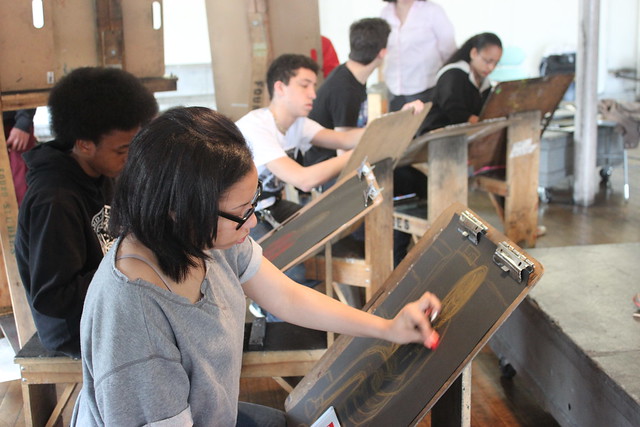how to become an art professor

"How did you become an art professor? Was the process hard? Would you say, that nowadays, approaching a career towards art is not realistic goal if you want to make a living in such "economy?"
Technically, to become an art professor, you need to have completed an MFA degree. Once you have the degree, this allows you to apply for college teaching positions. Although some graduate students get teaching experience by teaching undergraduates while they are completing their degree, many graduate students (like myself) start applying for college teaching positions with no prior college teaching experience.
In this sense, I do think that becoming an art professor can be difficult, in that you are totally left to your own devices. Teaching isn't something you can learn quickly; it takes years of hard work, mistakes, and troubleshooting. You have to learn almost everything on your own, on the fly, with no one there to walk you through every step of the process. I think I was more prepared than the average graduate student to teach because I had spent 4 years as an art teacher at an elementary school before I went on to graduate school. Naturally, teaching at the elementary school level is incredibly different than teaching college. However, I did learn fundamental communication and organizational skills during those 4 years that proved to be invaluable to me later on when I started to teach college.
I couldn't have had a better transition into college teaching: my first teaching position after graduate school was a one year sabbatical replacement for a painting/drawing position at a college preparatory school, Concord Academy in Concord, MA. College preparatory schools operate very much like miniature liberal arts colleges, and so it actually was a very similar experience to teaching at the college level. There were of course some big differences: each class I taught was 75 minutes long and met four times a week. By contrast, a college level course would run once a week for six hours. Fundamentally speaking, I felt like I was teaching at the college level due to the high caliber of faculty and students at the school.

At this teaching position, I learned tremendously about all aspects of teaching art. The best part of this experience was working with a fantastic group of colleagues in the art department, many of whom I still keep in touch with regularly. The camaraderie in the art department was wonderful, with a vibrant energy that all of the teachers contributed to.
I remember within the first few weeks of classes having a student who was particularly strong in painting, but who I was finding challenging to deal with. I was at a total loss what to do, so I talked to the drawing teacher who sat down with me and gave me great suggestions for how to approach the situation. I read other teachers' syllabi and course handouts. I exchanged ideas for assignments and looked at student work from other classes. I felt like a massive sponge all year, soaking up everything that anyone would teach me about teaching.
The following year, I transitioned into teaching at the college level. I landed a part-time position teaching in the Drawing area at the School of the Museum of Fine Arts, as well as another part-time position teaching in the fine arts department at the Art Institute of Boston at Lesley University, and spent four years at Wellesley College. Today, I primarily teach at RISD. My experience at Concord Academy armed me with the necessary tools of teaching that I needed to get going at the college level.
I think teaching is a realistic goal if you are prepared to be in it for the long haul; it's certainly not a profession that one can do casually. Teaching art at the college level has always been hugely competitive, regardless of how the economy is doing.
ART PROF is a free, online educational platform for visual arts for people of all ages and means. artprof.org features video courses, art critiques, an encyclopedia of art supplies, and more.
![]()
![]()
![]()
![]()
![]()
![]()
![]()
PORTFOLIO VIDEO CRITIQUES
Prof Lieu offers video critiques on portfolios for students applying to art school and working artists. More info.
ART DARES
Every month, we assign a topic for you to respond to with an artwork. We give out prizes in several categories! More info.
ASK THE ART PROFwas a written column in the Huffington Post from about art related topics. Visit our Pro Development page.
Related articles
"How do I become an undergraduate art professor?"
"What should I be working on now if I would like to be an art professor?"
"What makes a student artist stand out from their peers?"
"How do I become a teaching assistant?"
"How can I make the transition to teaching art at the college level?"
how to become an art professor
Source: https://claralieu.wordpress.com/2013/07/14/ask-the-art-professor-how-did-you-become-an-art-professor/
Posted by: buzzardsandemnotim.blogspot.com

0 Response to "how to become an art professor"
Post a Comment